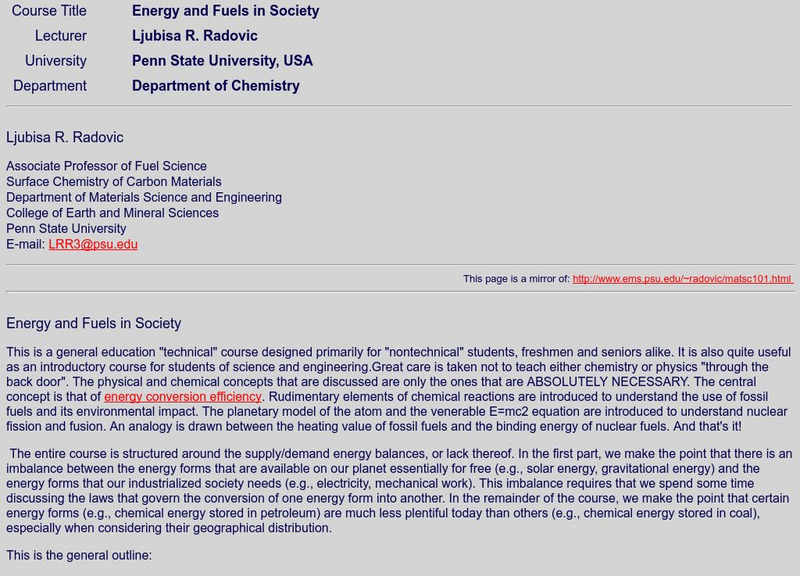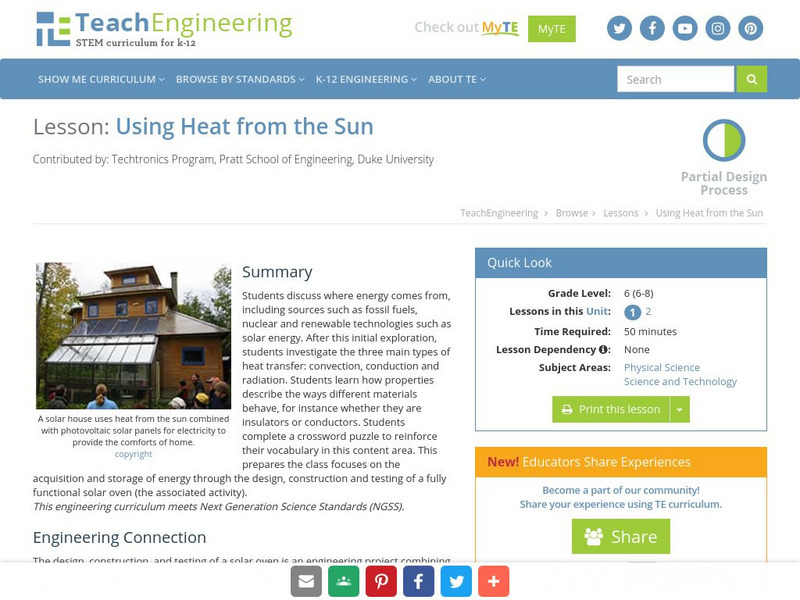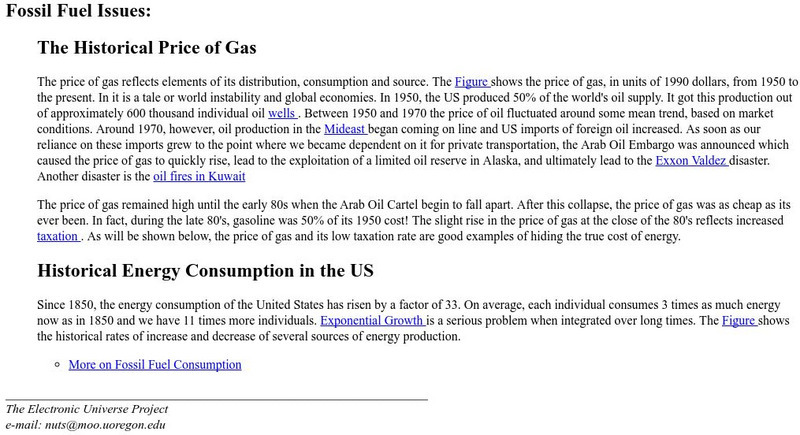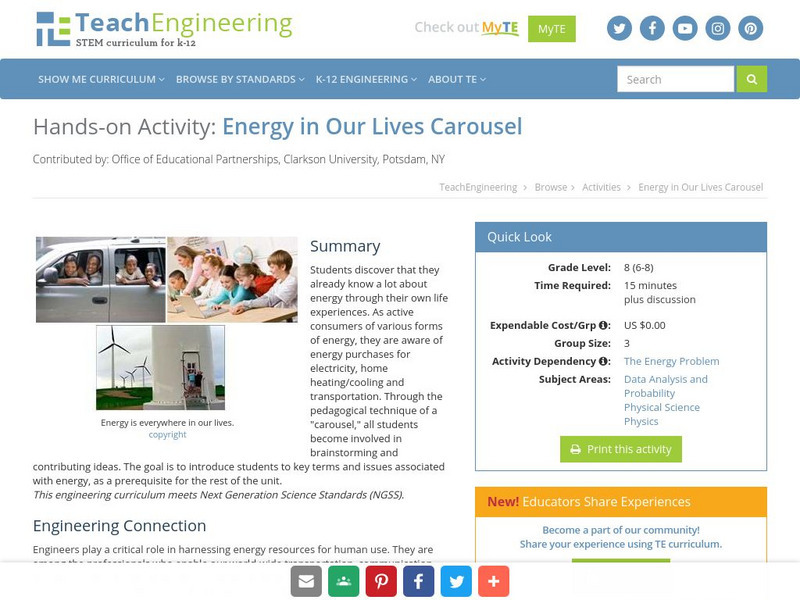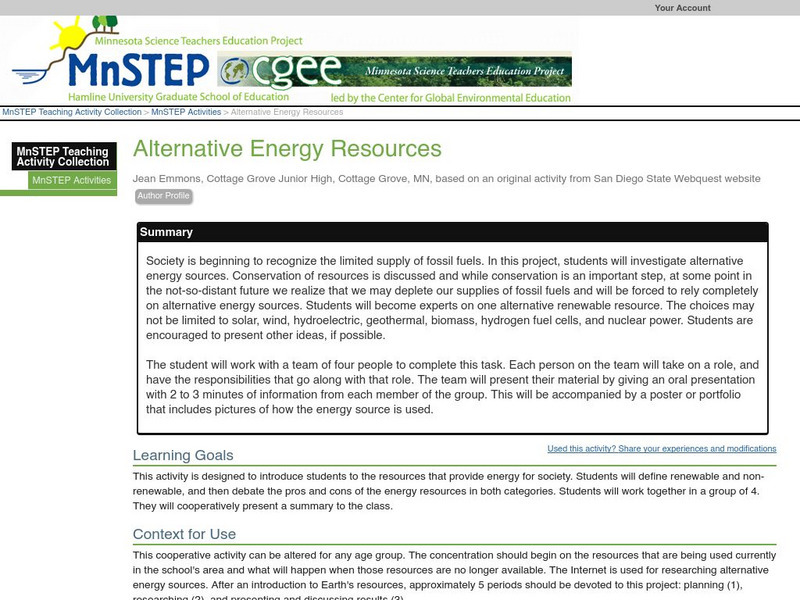Hi, what do you want to do?
Other
Moorland School: Earth Science Zone: Fossils Into Fuels
Learn that fossilized remains of dead plants and animals can form fossil fuels that are used to power to your car! Website describes the properties of crude oil, natural gas, and hydrocarbons.
Yale University
Yale New Haven Teachers Institute: Atmospheric Changes
Lesson unit on the effects of fossil fuel burning on the atmosphere. Includes particulates with good materials balance.
TED Talks
Ted: Ted Ed: Biofuels and Bioprospecting for Beginners
Biofuels can provide energy without the reliance on environmentally harmful fossils fuels, but scientists are still searching for a plentiful source. Craig A. Kohn demonstrates how cellulose, the naturally abundant tough walls of plant...
TeachEngineering
Teach Engineering: Engineering for the Earth
Young students are introduced to the complex systems of the Earth through numerous lessons on its natural resources, processes, weather, climate and landforms. Key earth science topics include rocks, soils and minerals, water and natural...
Nature Research
Nature Education: Energy Economics in Ecosystems
This article discusses how plants and microorganisms, until recently, have mostly controlled how much carbon dioxide is released into an ecosystem, and explains how this process works. Humans' burning of fossil fuels has upset the...
American Museum of Natural History
American Museum of Natural History: Ology: Rising Co2! What Can We Do?
With this resource, students learn how much fossil fuel emissions have increased since 1600 by exploring a graph showing carbon dioxide in our atmosphere. Then answer questions and read facts about climate change over the centuries....
National Academies of Sciences, Engineering, and Medicine
The National Academies: Our Energy Sources: Natural Gas
Energy production from natural gas is less destructive to the environment than energy produced from coal, but it is still produced from fossil fuels. While advances have been made in reducing its detrimental effects, our resources are...
Other
Penn State University: Energy and Fuels in Society
This site, which is provided for by the Penn State University, gives twenty one chapters of charts, graphs, and information on synthetic fuels.
US Department of Energy
Department of Energy: Fossil Energy Study Guide: Oil (Pdf)
This is a Fossil Energy Study Guide all about oil including where it is found, a map of the top oil states, the uses for petroleum, drilling for oil, and much more.
American Geosciences Institute
American Geosciences Institute: Energy
Seven hands-on lessons module where students learn about energy. These inquiry-based explorations investigate where energy resources come from and how they are converted into electricity, how fossil fuels form, the importance of...
BioEd Online
Bio Ed Online: Finding the Carbon in Sugar
Students learn that fossil fuels release energy when they are burned, and this takes the forms of light, heat, gases, etc. In this lesson they explore combustion with a candle and with sugar. The lesson and accompanying PowerPoint can...
DOGO Media
Dogo News: Peek Inside the World's First Carbon Neutral City
A new kind of city is being built in the Arab desert. Read about the unique engineering that is creating Masdar, a "city of the future" which doesn't use fossil fuels.
Georgia Department of Education
Ga Virtual Learning: Ap Environmental Science: Energy Use and Energy Sources
This interactive learning module will focus on the fundamentals of energy and energy sources, renewable and nonrenewable, that support the human population. Students will also explore our dependence on nonrenewable fossil fuels to...
TeachEngineering
Teach Engineering: Rolling Blackouts & Environmental Impact
The goal is for the students to understand the environmental design considerations required when generating electricity. The electric power that we use every day at home and work is generated by a variety of power plants. Power plants...
TeachEngineering
Teach Engineering: Using Heat From the Sun
In this lesson, students will first discuss where energy comes from, including sources such as fossil fuels, nuclear, and such renewable technologies as solar. After this initial exploration, students will investigate the three main...
PBS
Pbs Learning Media: Deciding Your City's Energy Future
Students learn about fossil fuels and renewable energy sources to help them decide which type of energy should be used to power a city's electric grid in the coming decades.
Scholastic
Scholastic: Study Jams! Science: Energy, Light and Sound: Renewable Fuels
A slideshow and a short quiz on the different types of renewable energy sources.
University of Oregon
Electronic Universe Project: Fossil Fuel Consumption
Information on historical energy consumption in the U.S. and projected figures.
National Geographic
National Geographic: Encyclopedic Entry: Non Renewable Energy
A good primer on non-renewable energy sources. Covers the overall advantages and disadvantages, and discusses the different types and their pros and cons. Includes a slideshow with captions.
TeachEngineering
Teach Engineering: Energy in Our Lives Carousel
This activity is a way for students to discover that they already know a lot about energy through their own life experiences. As active consumers of various forms of energy, they are aware of energy purchases for electricity, home...
TeachEngineering
Teach Engineering: Corn for Fuel?!
In this activity, students examine how to grow plants the most efficiently. They imagine that they are designing a biofuels production facility and need to know how to efficiently grow plants to use in this facility. As a means of...
Science Education Resource Center at Carleton College
Serc: Alternative Energy Resources
Society is beginning to recognize the limited supply of fossil fuels. In this project, students will investigate alternative energy sources. Conservation of resources is discussed and while conservation is an important step, at some...
Other popular searches
- Fossil Fuels Experiments
- Formation of Fossil Fuels
- Fossil Fuels Activity
- Science Fossil Fuels
- What Are Fossil Fuels
- Dinosaurs and Fossil Fuels
- Environment Fossil Fuels
- Environment Fossil Fuels
- Depletion of Fossil Fuels
- Fossil Fuels (Labs)
- Cracking , Fossil Fuels
- Fossil Fuels Experements












